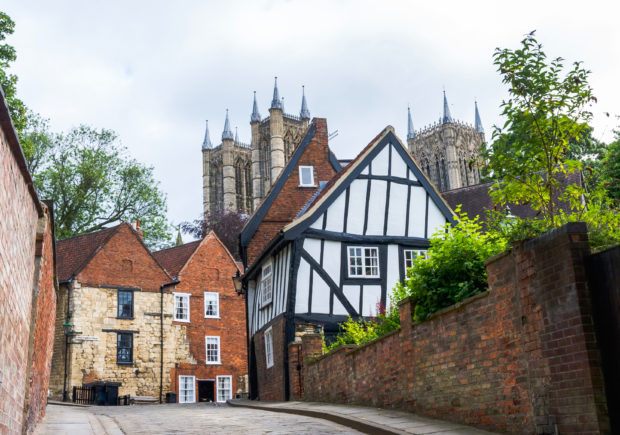4 Teens Found Her Skull In A Hollow Tree Back In 1943, And A Piece Of Fabric Had Been Shoved Down Her Throat, But Do This Day, Nobody Knows Who She Was Or Who Murdered Her

In 1943, four teenage boys from England began hunting for bird eggs and rabbits in Hagley Wood when they happened upon a puzzling discovery. At first, the boys believed they had found an animal skull inside of a hollowed witch hazel tree.

ermess – stock.adobe.com – illustrative purposes only, not the actual tree
Next to the skull, there was a pair of women’s shoes and a bottle, too. But once the teens grabbed the items and brought them into the daylight, they realized that the skull had hair and human teeth.

Vasily Merkushev – stock.adobe.com – illustrative purposes only, not the actual bottle
The group’s first instinct was to show the skull to one of the boys’ older brothers. Afterward, though, the teens realized they were never supposed to be on the property that day and did not want to get in trouble.

Denis – stock.adobe.com – illustrative purposes only, not the actual person
So, the skull, bottle, and shoes were put back into the hollow tree trunk, and the group never told anyone else about their discovery.

bonciutoma – stock.adobe.com – illustrative purposes only
Well, that was except for one boy– the youngest of the friends– who decided to tell his parents about their bizarre finding. The police were then notified, and an investigation was launched.

vadimmva – stock.adobe.com – illustrative purposes only, not the actual person
Authorities ended up retrieving the skull from the tree yet again and also exhuming an entire skeleton along with additional personal items. The belongings were believed to have belonged to a middle-aged and petite woman who’d had at least one child.

mangostock – stock.adobe.com – illustrative purposes only
The woman had irregular teeth, dark hair, and pieces of taffeta– a fabric– shoved down her throat. She was also missing a hand– which was found buried next to the tree– and was believed to have been dead for at least a year and six months.

Stepan Popov – stock.adobe.com – illustrative purposes only
The finding of this woman’s remains came as World War II raged on, though, so there was a significant upswing in the number of missing person reports being filed in Europe.

alexkich – stock.adobe.com – illustrative purposes only
And due to the personal effects found with the remains, authorities believed the woman was foreign– possibly from Germany or the Netherlands.

kharchenkoirina – stock.adobe.com – illustrative purposes only, not the actual person
On top of that, no missing person matching the woman’s description had been reported near Hagley Wood, and dental record comparisons also turned up no matches. In turn, the woman’s case eventually fell to the wayside in wartime England and went cold.

Zayne C. – stock.adobe.com – illustrative purposes only
But then, during Christmas time in 1944, cryptic graffiti referring to the woman’s death appeared on an abandoned building located in the town of Old Hill.

alexshadyk – stock.adobe.com – illustrative purposes only
The writer asked, “WHO PUT LUEBELLA DOWN THE WYCH-ELM?” in three-inch-tall letters. For context, witch hazel and wych elm trees are often mistaken for each other.

anney_lier – stock.adobe.com – illustrative purposes only
And afterward, other variations of this same question began popping up around the Midlands. Some referred to the woman as Luebella, while others called her Bella.

tolly65 – stock.adobe.com – illustrative purposes only
The area of Hagley Wood was also mentioned in a few of the writings. Yet, all of the graffiti appeared to have been written by the same person using a white chalk and block letters.

BillionPhotos.com – stock.adobe.com – illustrative purposes only
Whether or not the vandal actually knew the woman’s true identity remains to be seen, primarily because they never got in touch with the police.

Brian Jackson – stock.adobe.com – illustrative purposes only
However, the Jane Doe was seemingly given a name around town via all of the writings– Bella– and both community members and the police alike ran with it.

Olya GY – stock.adobe.com – illustrative purposes only
Over the following years, countless tales and theories about what had happened to Bella began to swirl throughout the community.

kharchenkoirina – stock.adobe.com – illustrative purposes only, not the actual person
Some people claimed she was the victim of the assault, and others believed she was a gypsy woman who had been ostracized.

kharchenkoirina – stock.adobe.com – illustrative purposes only, not the actual person
Many also claimed that Bella’s severed hand referred to a black magic ritual known as “The Hand of Glory.” This ritual was said to transfer the power of a deceased criminal to the living.

samiramay – stock.adobe.com – illustrative purposes only
This theory was only further believed since, at the time, a witch’s spirit was thought to be imprisoned if her body was placed within a hollow tree.

Rustic Witch – stock.adobe.com – illustrative purposes only
Interestingly, though, perhaps none of these theories ever pointed to Bella’s true identity– since there was a spy ring operating in the Midlands during wartime. Moreover, a woman named Clarabella Dronkers was the wife of a well-known Dutch spy who was about thirty years old at the time and also had irregular teeth.

korionov – stock.adobe.com – illustrative purposes only, not the actual person
Similarly, a thirty-five-year-old cabaret actress from Germany named Clara Bauerle had been involved in Nazi espionage before disappearing in 1941. She was also known for her unusual teeth.

daryakomarova – stock.adobe.com – illustrative purposes only, not the actual person
Still, despite all of the folklore and hunches, the true identity of “Bella” was never uncovered– nor were the actual circumstances of her murder. The tree that her remains were found in has died, and her case has remained cold ever since.

daryakomarova – stock.adobe.com – illustrative purposes only, not the actual person
Yet, the public conversation about Bella continued on. Questions about who put her down the “wych elm” continued to pop up all over the English Midlands for years. But, much like Bella, the graffiti artist behind the question has never been identified, either.

Bernd Brueggemann – stock.adobe.com – illustrative purposes only
Sign up for Chip Chick’s newsletter and get stories like this delivered to your inbox.
More About:True Crime





